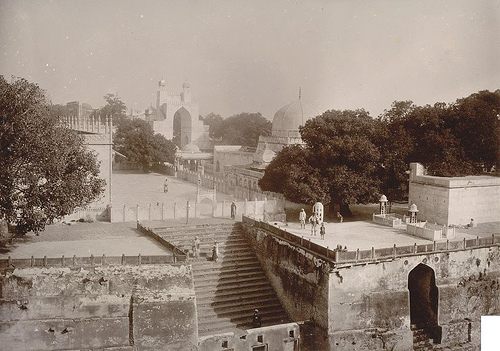Topic Suggested by: Faiz Zain (age 15 yrs), Kingdom of Bahrain
Discussion Script by: Saheeba Shaikh (age 20 yrs), Kingdom of Bahrain

Introduction
The history of the Internet starts in the 1950s and 1960s as a global system of interconnected computer networks. The internet has changed our way of life. It is like a revolution that changed the map of the world. As we know, Islam is a way of life. There is no topic that is not related to Islam. Islam is often mistaken as a rigid religion. In fact Islam is very wide, it is not rigid, and it only purifies the culture, practices and other things through its principles for the betterment of all humanity. To understand the link between Internet and Islam, let us first understand what the sources of Information in Islam are. There are 2 types of sources
viz. Primary and Secondary. Primary sources are the Glorious Holy Quran and the Blessed Prophetic Hadeeth. The secondary sources are Ijma (Consensus-opinion of majority of Scholars) and Qiyas (Analogy-to apply a known injunction to a new circumstance and create a new injunction). Now, since the internet has evolved only half a decade ago, any exact verse in the Quran or the Hadeeth has not been provided. Although Islam may not have talked about the Internet specifically, it has talked about the universal principles that govern the use of the internet. Thus we have to apply Qiyas in order to evaluate the internet in the light of Islam.
Internet as a Means of Communication
What is the internet? It is basically a network connecting different devices for the purpose of communication. Thus, we know the main essence of internet is communication. There are many Hadeeth that provide us the guidelines as to how we should communicate with others. The main guidelines as told by our beloved Prophet Muhammad (sal Allahu alayhi wa sallam) are:
Whenever you speak, only speak the truth:
Narrated ’Abdullah radi Allahu anhu:
The Prophet (sal Allahu alayhi wa sallam) said, “Truthfulness leads to righteousness, and righteousness leads to Paradise. And a man keeps on telling the truth until he becomes a truthful person. Falsehood leads to Al-Fajur (i.e. wickedness, evil-doing), and Al-Fajur (wickedness) leads to the (Hell) Fire, and a man may keep on telling lies till he is written before Allah, a liar.â€Â (Sahih Bukhari, Volume 8, Book 73, number 116)
Narrated Samura bin Jundub radi Allahu anhu:
The Prophet (sal Allahu alayhi wa sallam) said, “I saw (in a dream), two men came to me.†Then the Prophet (sal Allahu alayhi wa sallam) narrated the story (saying), “They said, ‘The person, the one whose cheek you saw being torn away (from the mouth to the ear) was a liar and used to tell lies and the people would report those lies on his authority till they spread all over the world. So he will be punished like that till the Day of Resurrection.â€â€˜ (Sahih Bukhari, Volume 8, Book 73, Number 118)
Thus we know that, we must always abstain from telling lies even on the internet, like updating a Facebook status which is a lie, Tweeting a false statement or even e-mailing someone a lie.
Do not Backbite and slander and spy others :
“O you who believe! Avoid much suspicion, indeed some suspicions are sins. And spy not neither backbite one another. Would one of you like to eat the flesh of his dead brother? You would hate it (so hate backbiting). And fear God, verily, God is the One who accepts repentance, Most Merciful.†(Holy Quran Al-Hujurat 49: 12)
 Prophet Muhammad (sal Allahu alayhi wa sallam) said: “Do you know what backbiting is?†They said, “God and His Messenger know best.†He then said, “It is to say something about your brother that he would dislike.†Someone asked him, “But what if what I say is true?â€Â The Messenger of God (sal Allahu alayhi wa sallam) said, “If what you say about him is true, you are backbiting him, but if it is not true then you have slandered him.â€Â (Muslim)
Thus we must refrain ourselves from any kind of backbiting, slander or even spying on the internet. We must not hack into others’ accounts or publish someone else’s private information without their permission. We must also not access some else’s account if they forget to sign out. We must also refrain from any vain, unnecessary talk like gossiping. If a group is indulged in such talk we must leave the group. Same applies to the internet.
Internet as a Source of Information
The second aspect of internet is that it serves as a source of information. We must first understand the difference between Data, Information and Knowledge. Data are raw facts. E.g.: The letter “Aâ€. As a single letter it doesn’t tell us much. However when combined with other letters and processed into a word such as “Aâ€pple, it then becomes information, because the world “Apple†gives us the information that it is a fruit, its color may be red etc. Information therefore is processed data. Knowledge on the other hand is Light, it shows you the way, and is beneficial guidance. E.g.: An apple a day, keeps a doctor away. True knowledge will always benefit you. Internet can only be considered as a source of information and not a source of knowledge, i.e. guidance. We can get a world of information from the internet but not all of it may be correct. Therefore, we cannot consider it an authoritative source of knowledge because the internet can also be misguiding. The only true sources of guidance are the teachers and scholars who have the insight to process the information into knowledge which truly benefits. Nothing can replace a teacher. In the Islamic context, Information available on the internet cannot be considered superior to knowledge of the Ahle-dhikr (the People of Remembrance, i.e. the pious scholars.) As a matter of fact, the Holy Quran commands us to turn to the Ahle-Dhikr when we want knowledge:
 “…Ask the People of Remembrance, if you do not know.â€Â (Holy Quran Al-Ambiya 21:7, An-Nahl 16:43)
We may gain much information from the internet but to say that we have the knowledge of Islam more than the learned scholars because we have read it on the internet is absolutely wrong. Apart from this, when we pass on the information to others on the internet, we must also make sure the information we pass is true and authentic. We should not blindly forward emails to others without checking its authenticity.
Internet as a Means of Da’wah (Invitation)
The third and the final aspect of the internet is that it is a means of Da’wah, i.e. inviting others to Islam in the best way. As we know internet is amongst the fastest ways to communicate to a large number of people at a time, we can use it to our advantage and gain much reward (sawab.)
“Invite to the Way of your Lord (i.e. Islam) with wisdom and fair preaching, and argue with them in a way that is better. Truly, your Lord knows best who has gone astray from His Path, and He is the Best Aware of those who are guided.†(Holy Qur’an, An-Nahl 16:125)
Thus we know the importance of Da’wah in Islam. We must all utilize the internet as a tool to teach and inform others about the truth of Islam especially given the many negative stereotypes that have become prevalent these days.
Conclusion:
- We can use the technique of Qiyas (Analogy) to relate Islam and Internet;
- The main Guidelines to follow when using internet as a tool to communicate are: Always speak the truth; Never Backbite, Slander or Gossip; Respect each other’s privacy;
- We must take care while we use the internet as a source of information. We must not rely on it as an authoritative source of guiding knowledge – this can only come from the pious scholars;
- We must use internet as a tool to do Da’wah;
Saheeba Shaikh
(age 20 yrs), Kingdom of Bahrain
Â
* YDF (Youth Discussion Forum) is an IECRC effort initiated in the Kingdom of Bahrain in order to engage Muslim youth in thoughtful and vibrant discussions on topics that are of interest to THEM. All too often youth are exposed to Islam in a one directional manner as a dry set of do’s and don’ts failing to reveal its rich intellectual heritage and spiritual depth and beauty. Through these discussions on topics chosen by the youth themselves, the goal of the YDF is three fold:
- To make youth realize that there is no topic that can be separated from the holistic principles and balanced values of Islam, whether it is the internet, music or movies; that Islam guides every area of life beyond praying, fasting and reading the Holy Quran.
- To break the stereotype that Islam is a dry set of do’s and don’ts and that on the contrary it is a vast and vibrant religion with a rich historical heritage which encourages intellectual discussions, not for the sake of polemics but for the sake of Allah and His Beloved Prophet Muhammad (peace be upon him and his family and companions.)
- To break the stereotype that Islam doesn’t care about how you feel about things. On the contrary Islam is very sensitive to human emotions and provides practical tools to channel it in a productive way thereby nurturing the spirit.
Eco World Content From Across The Internet.

Featured on EcoPressed
Mental Health and Climate Change
Advertisement









